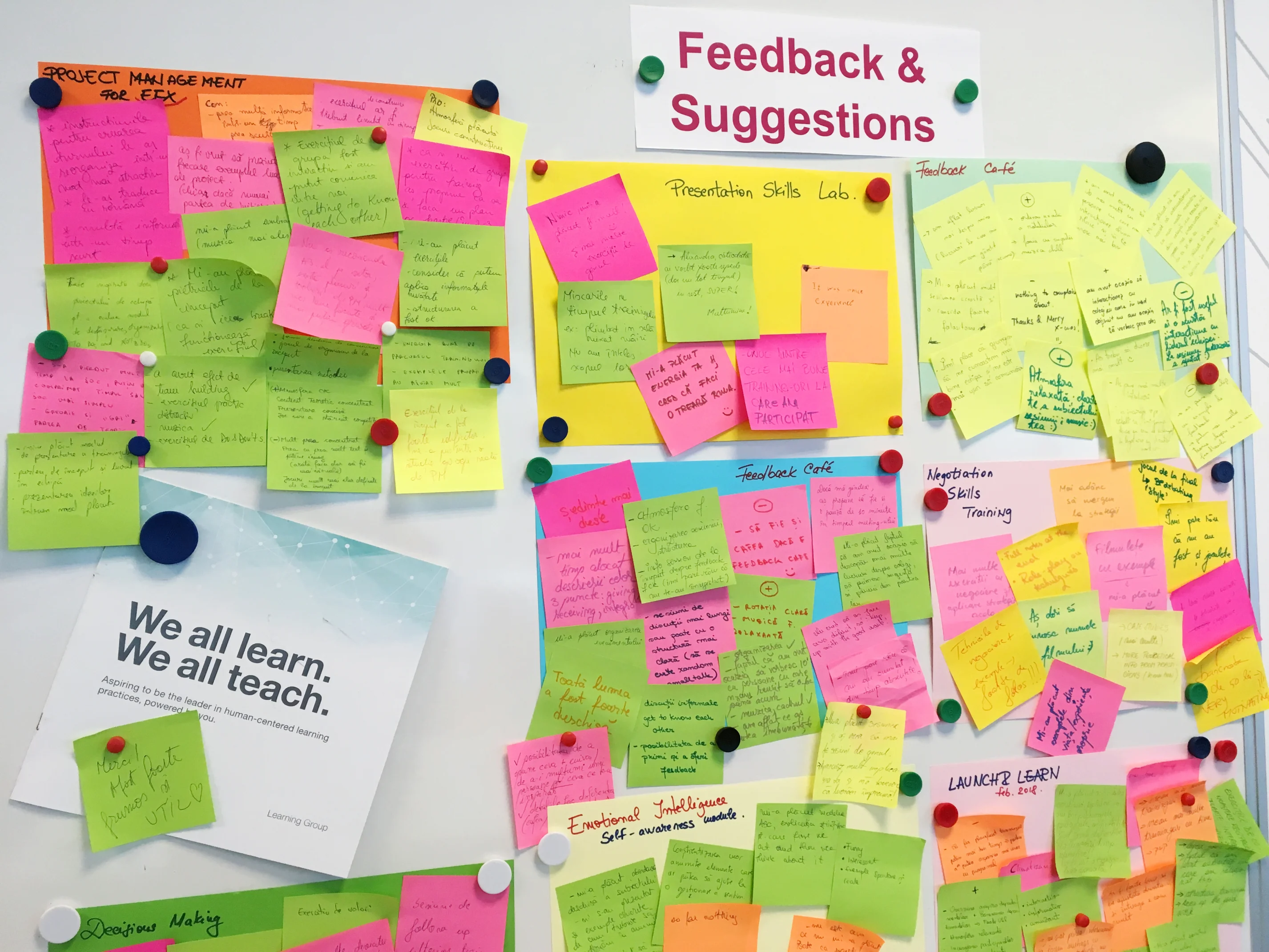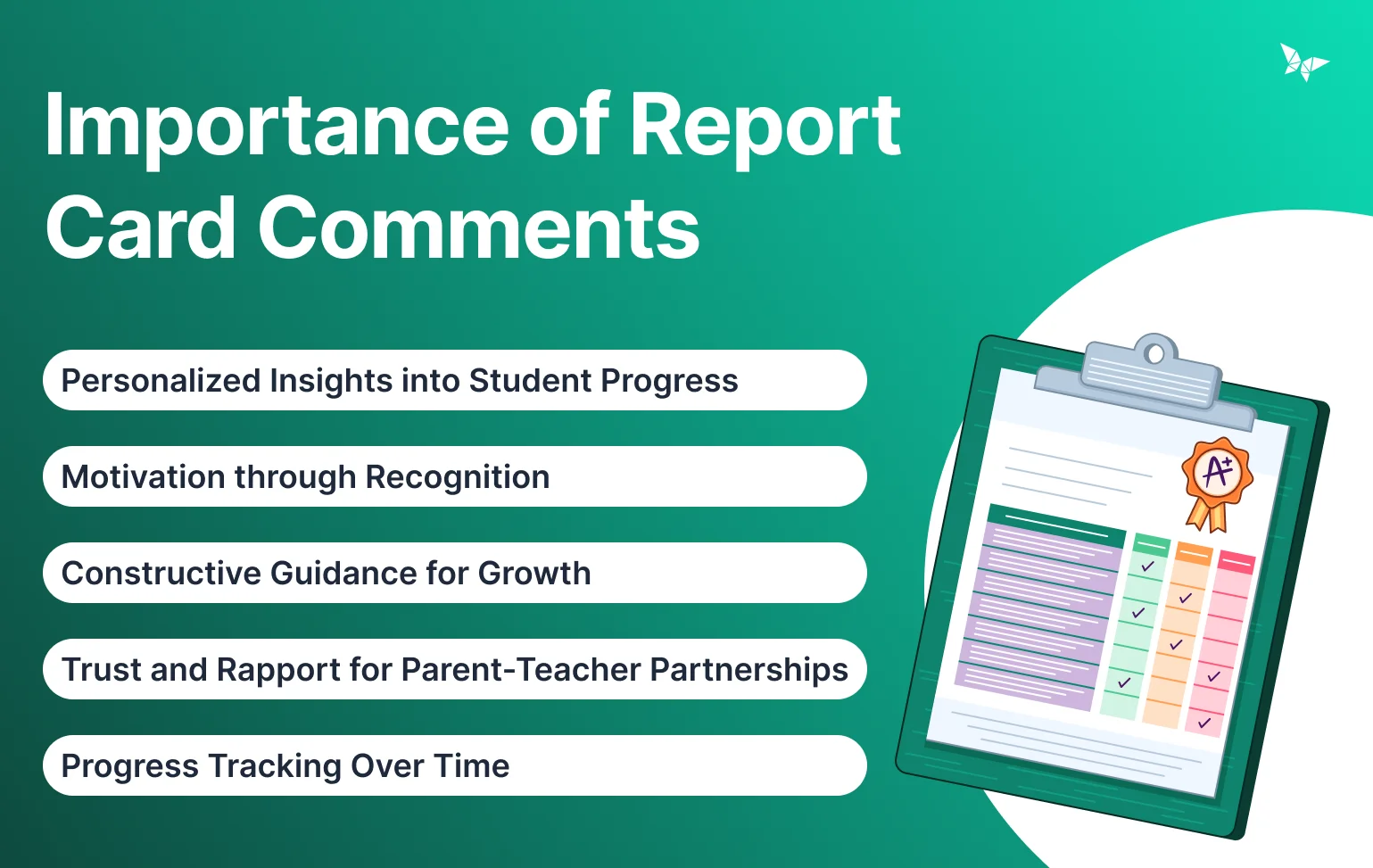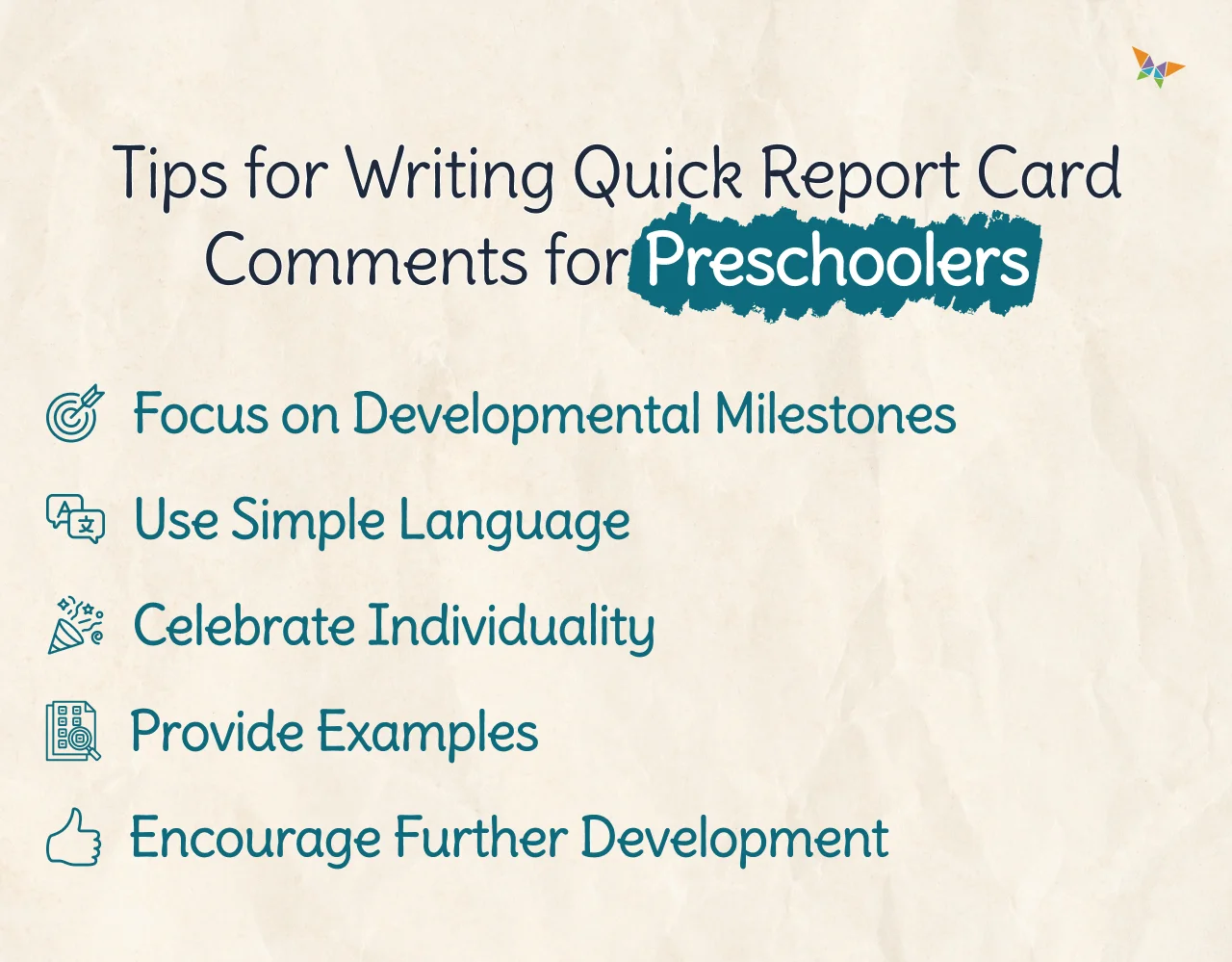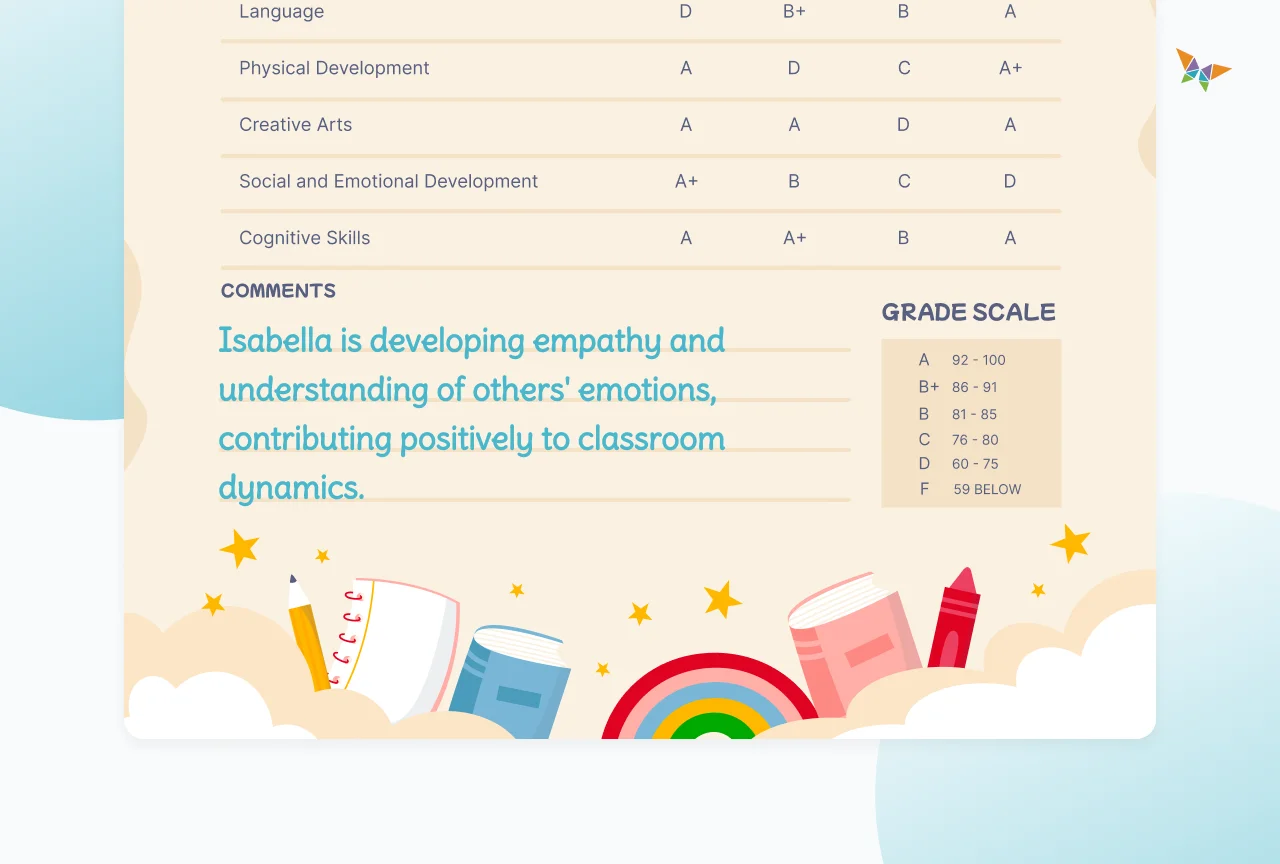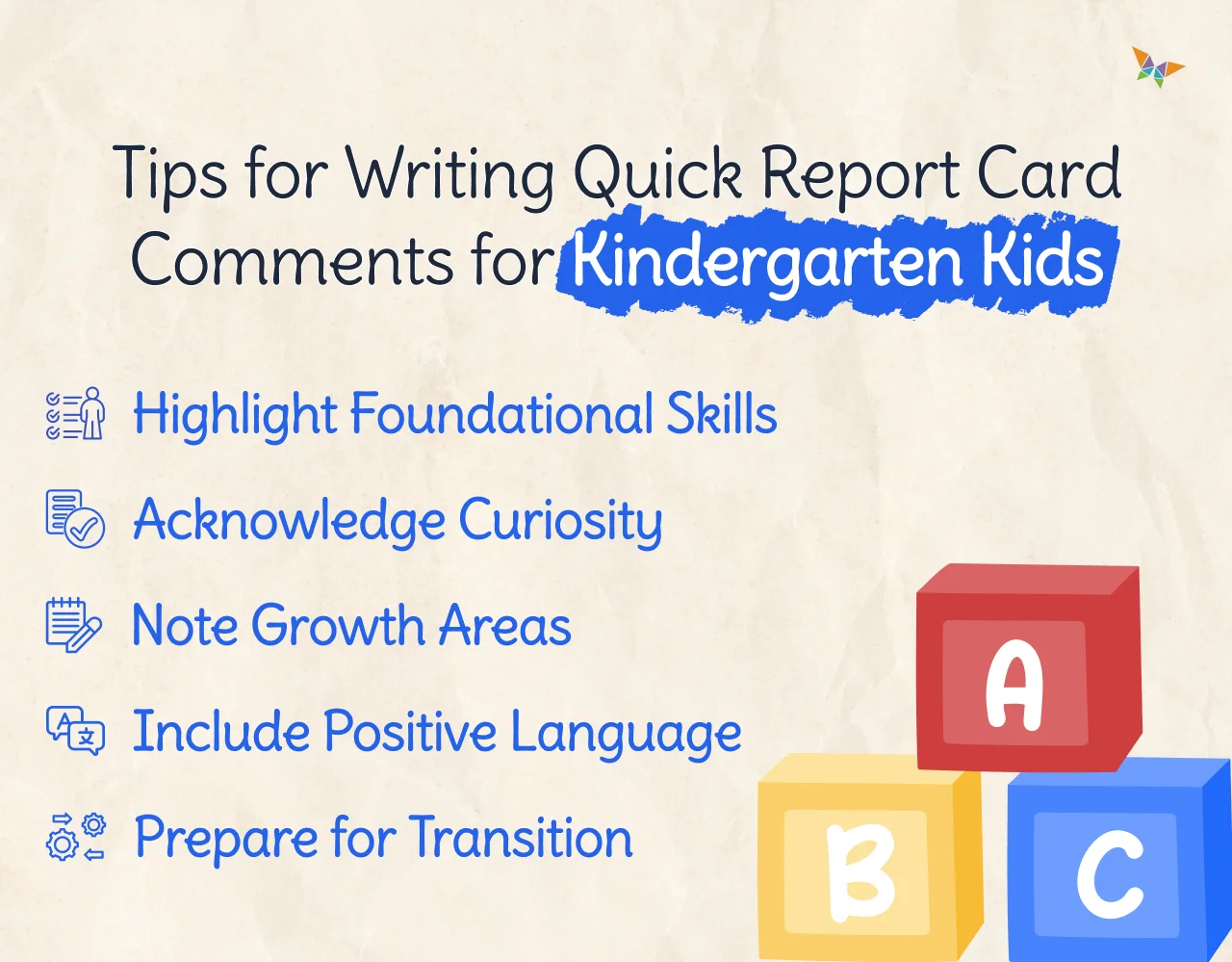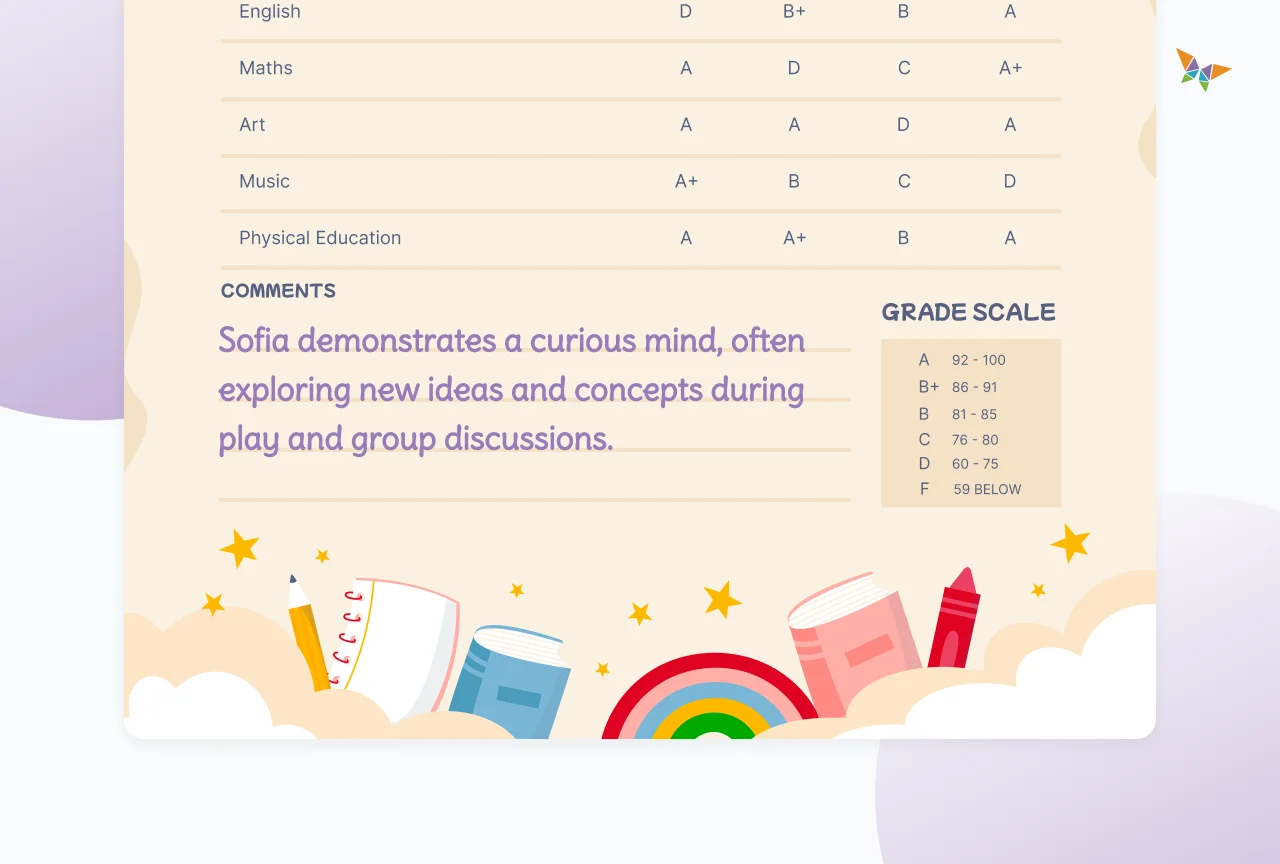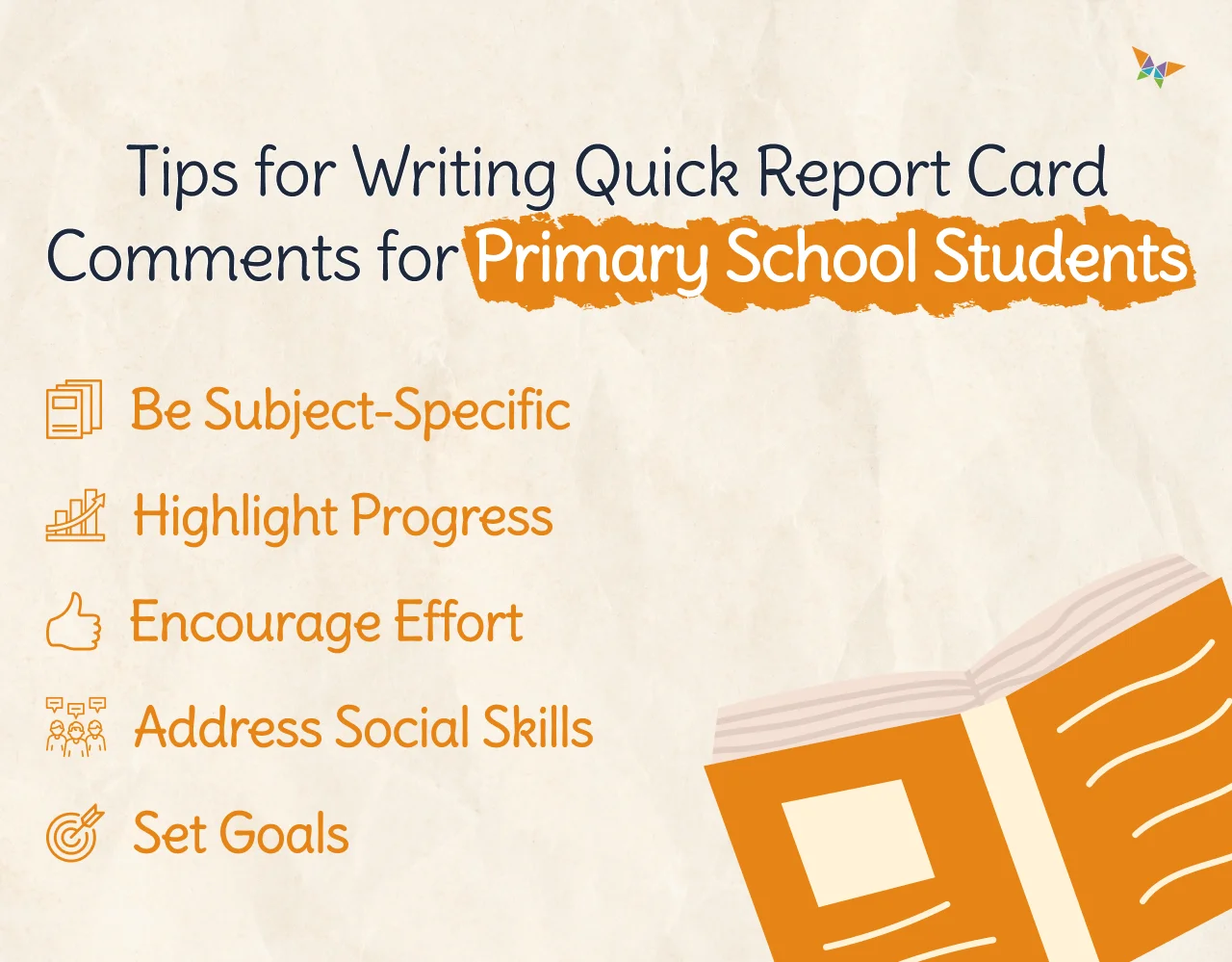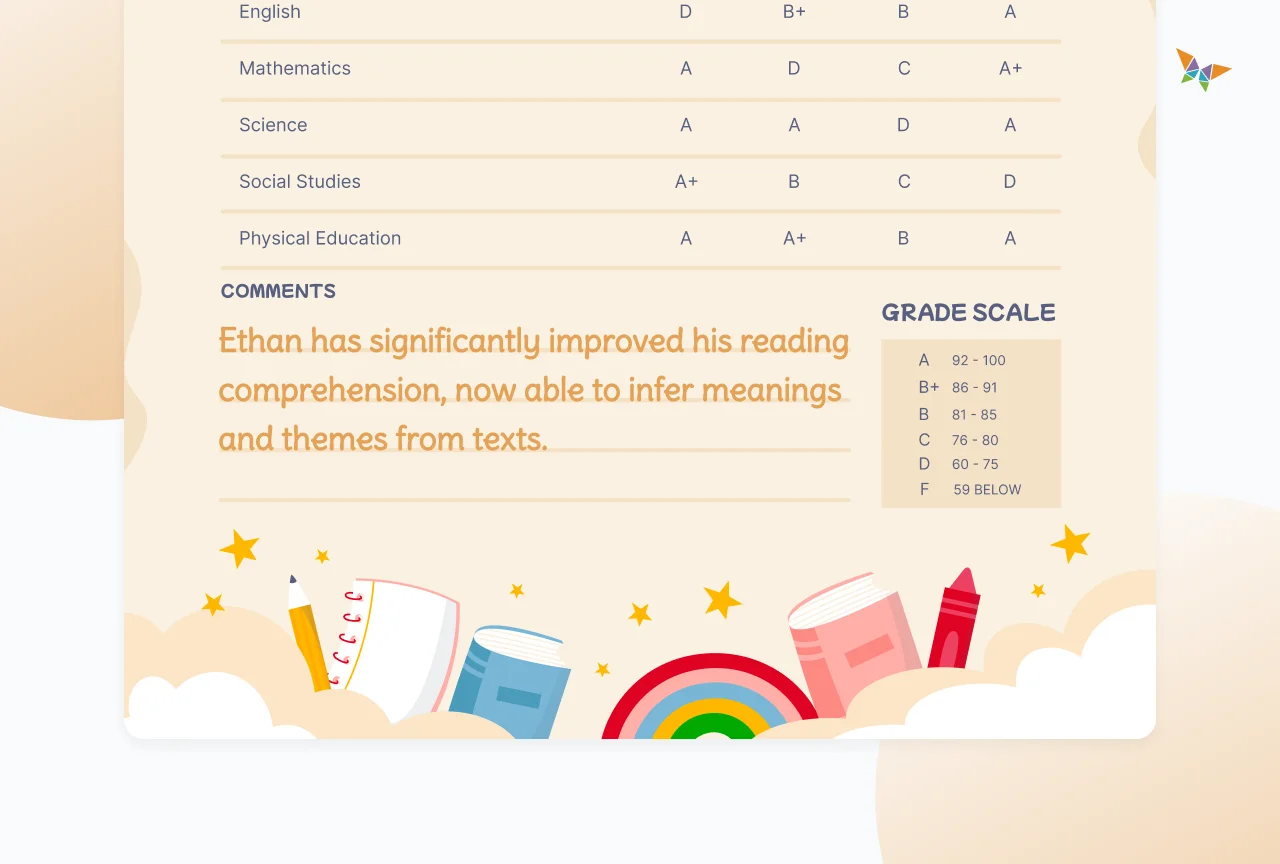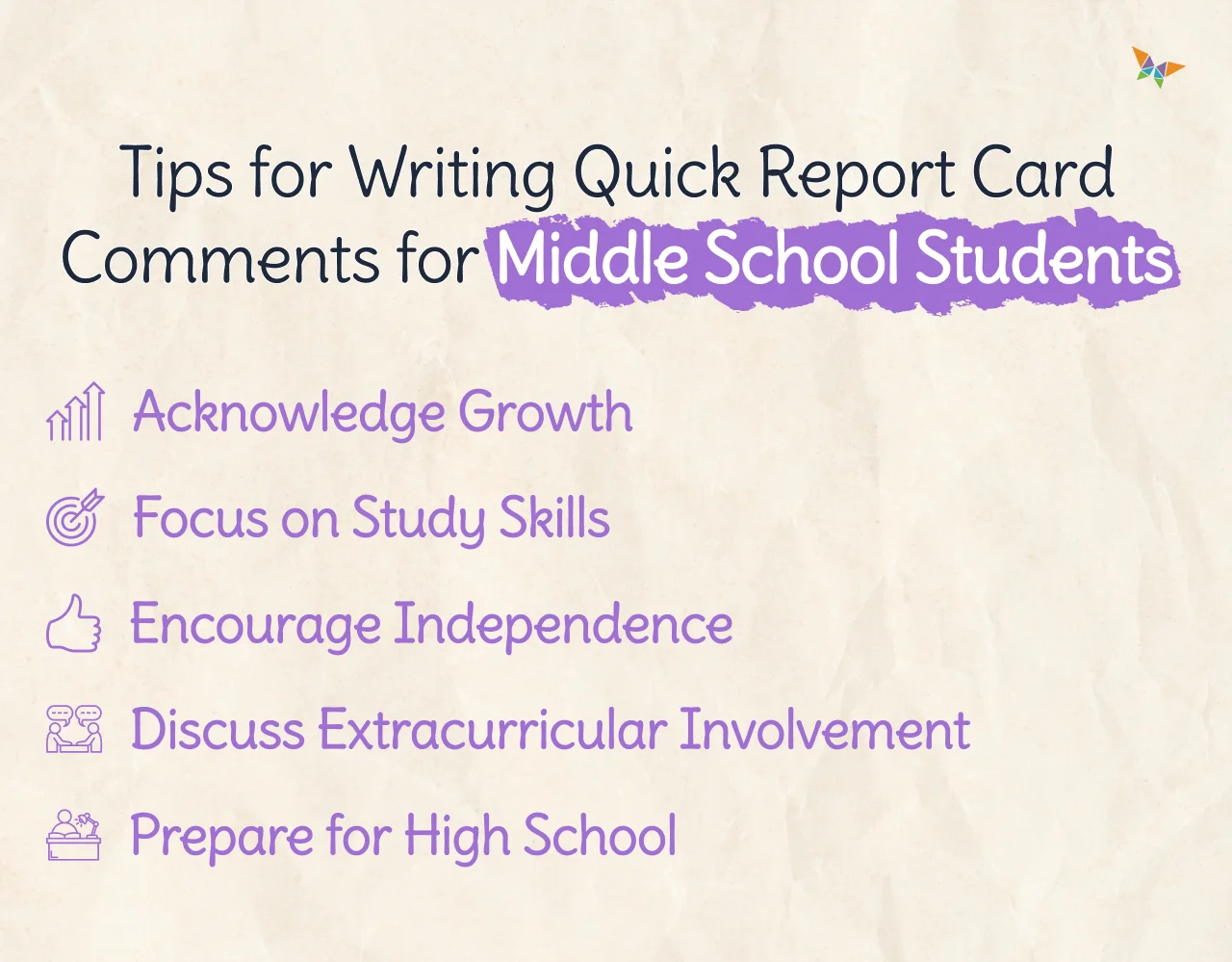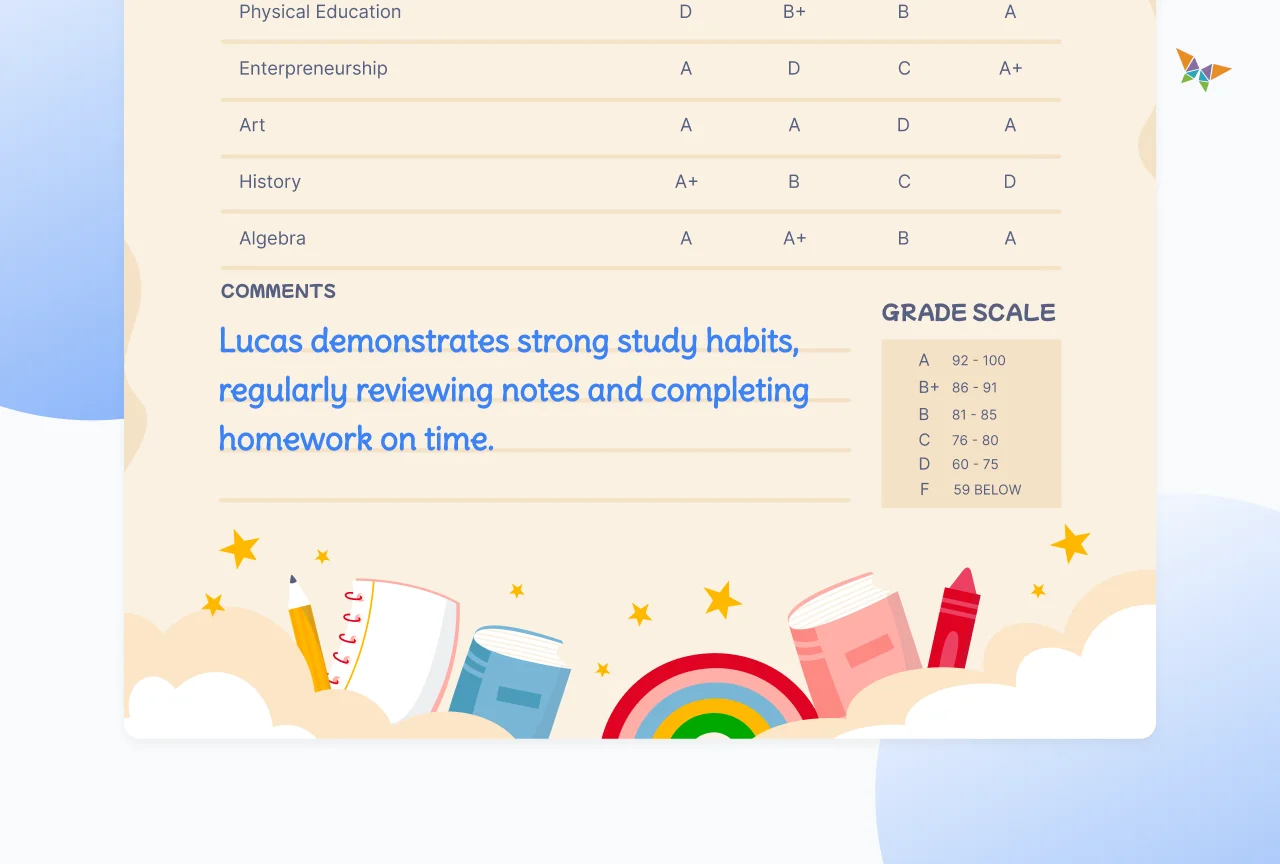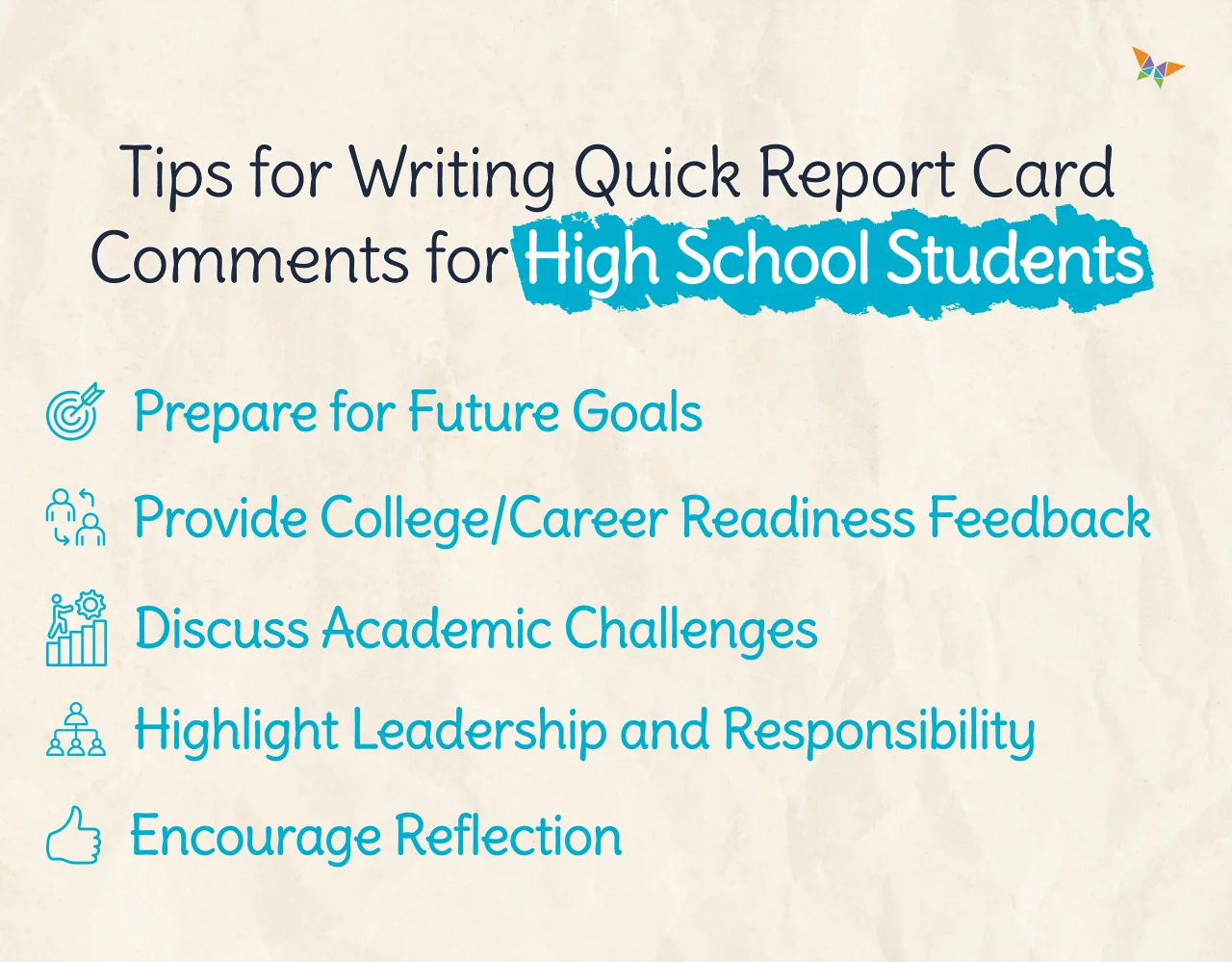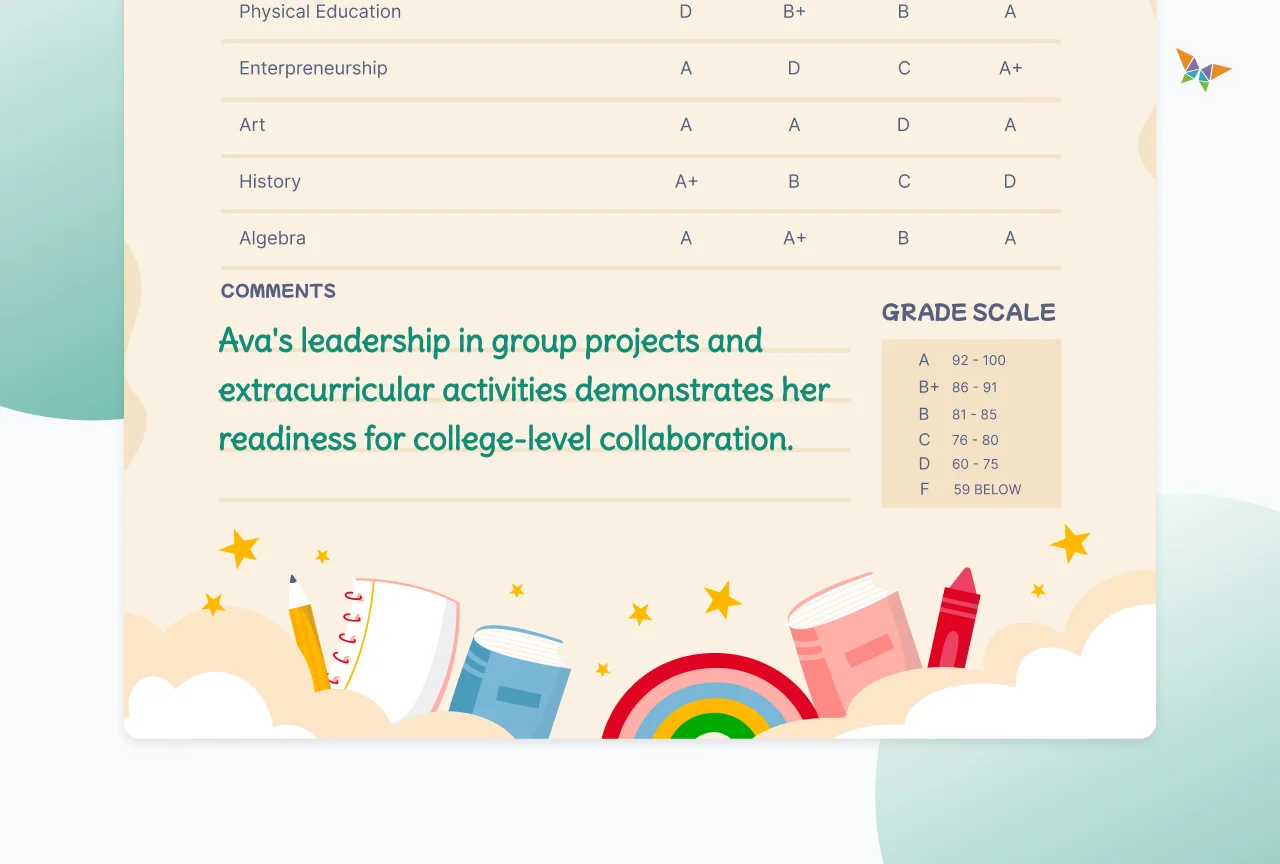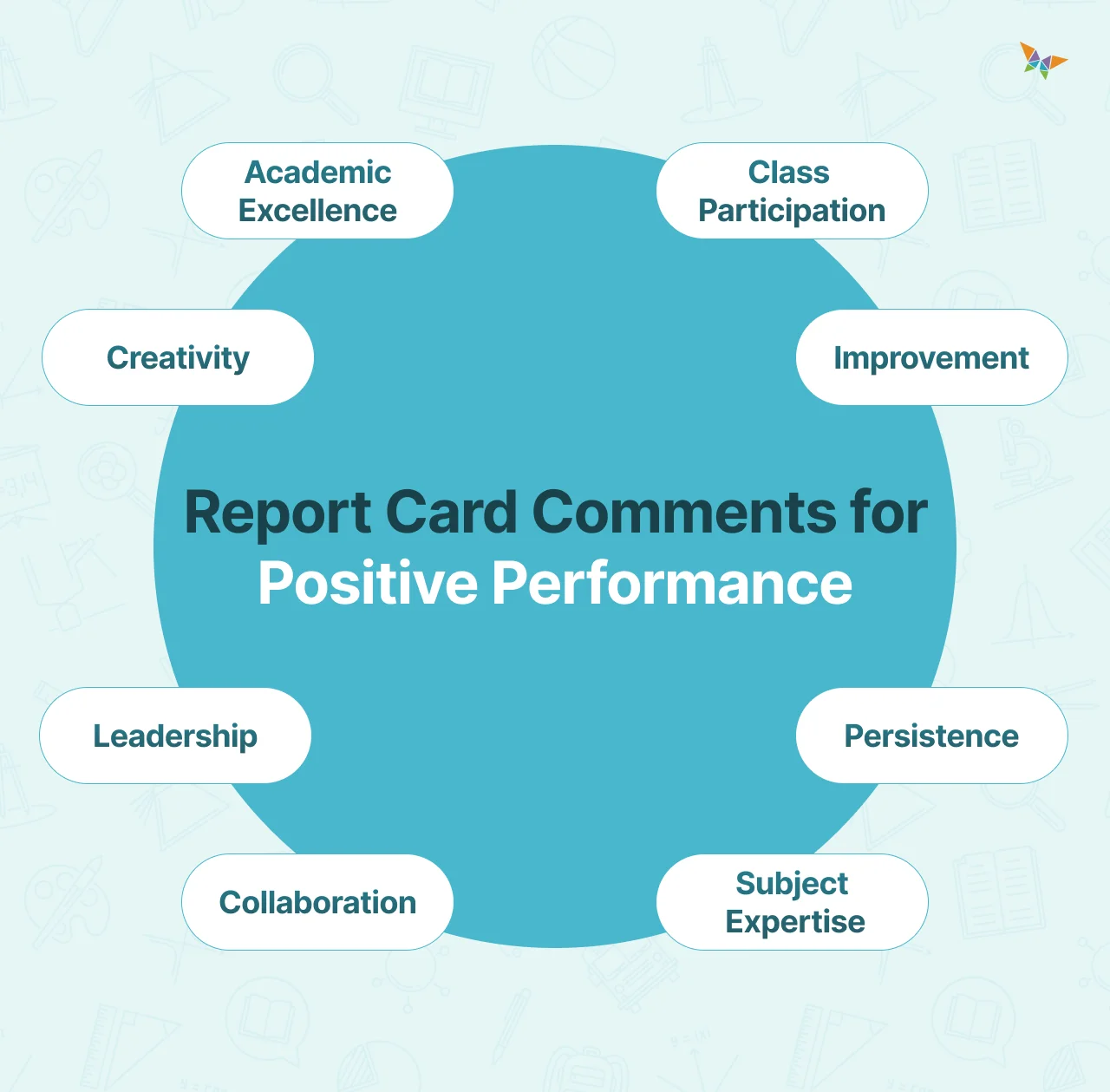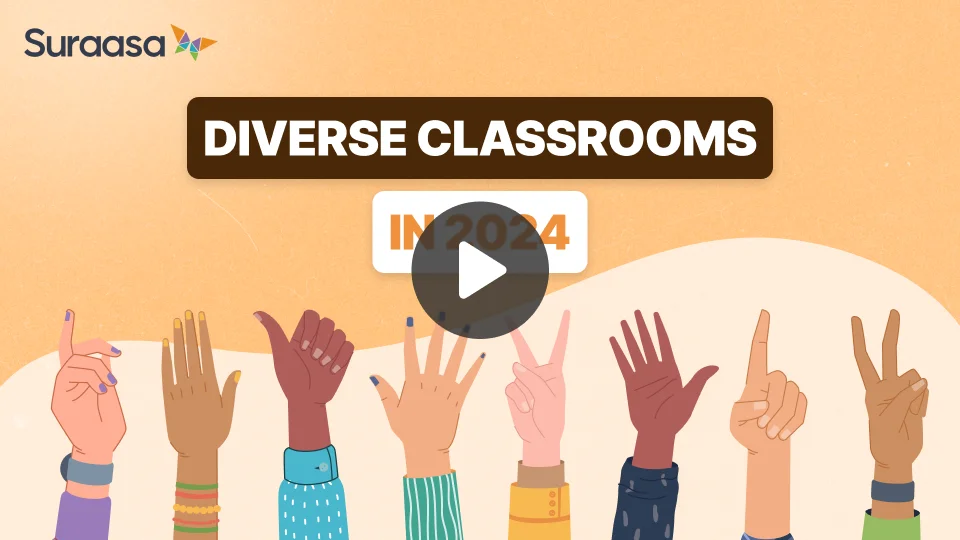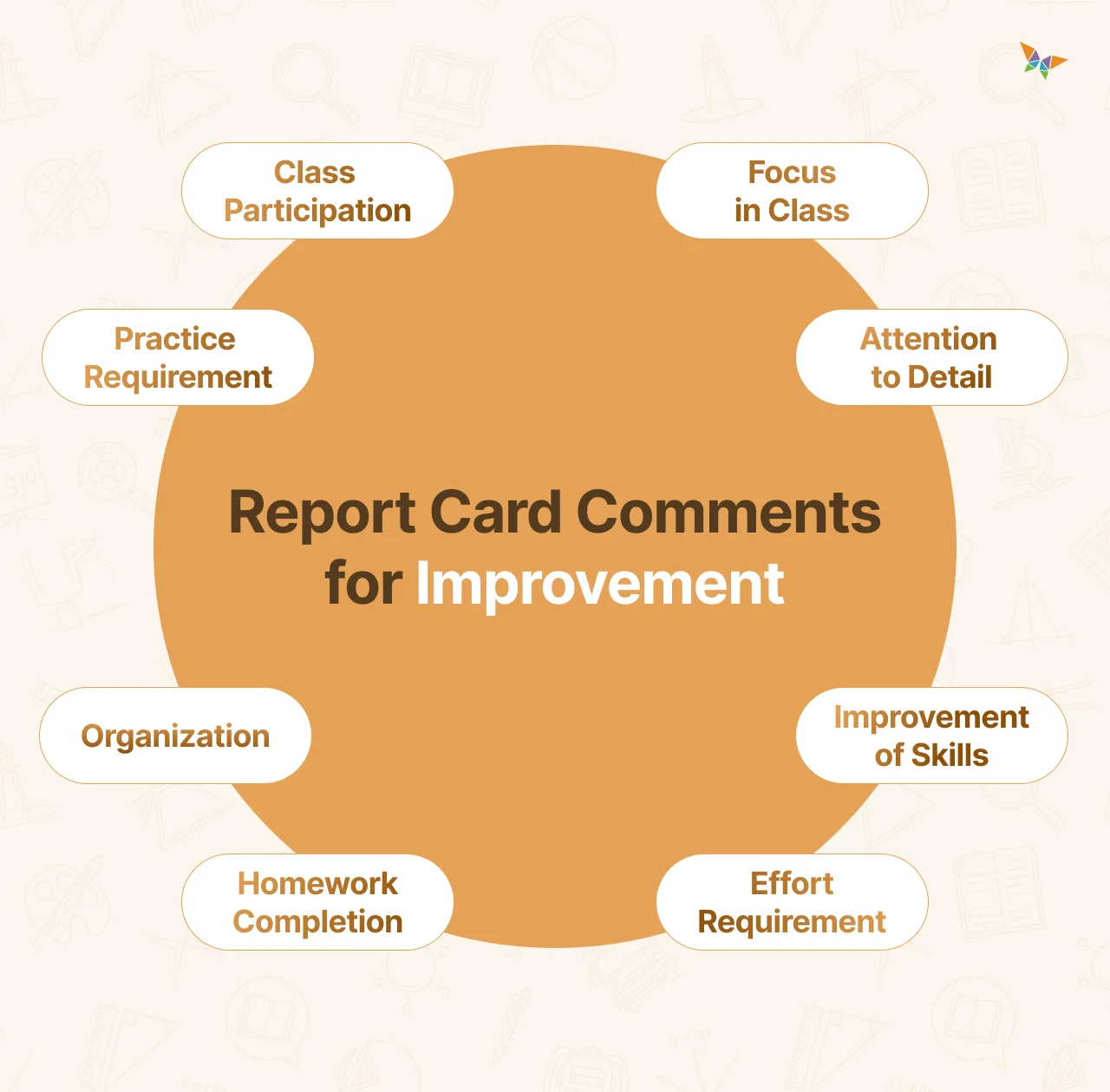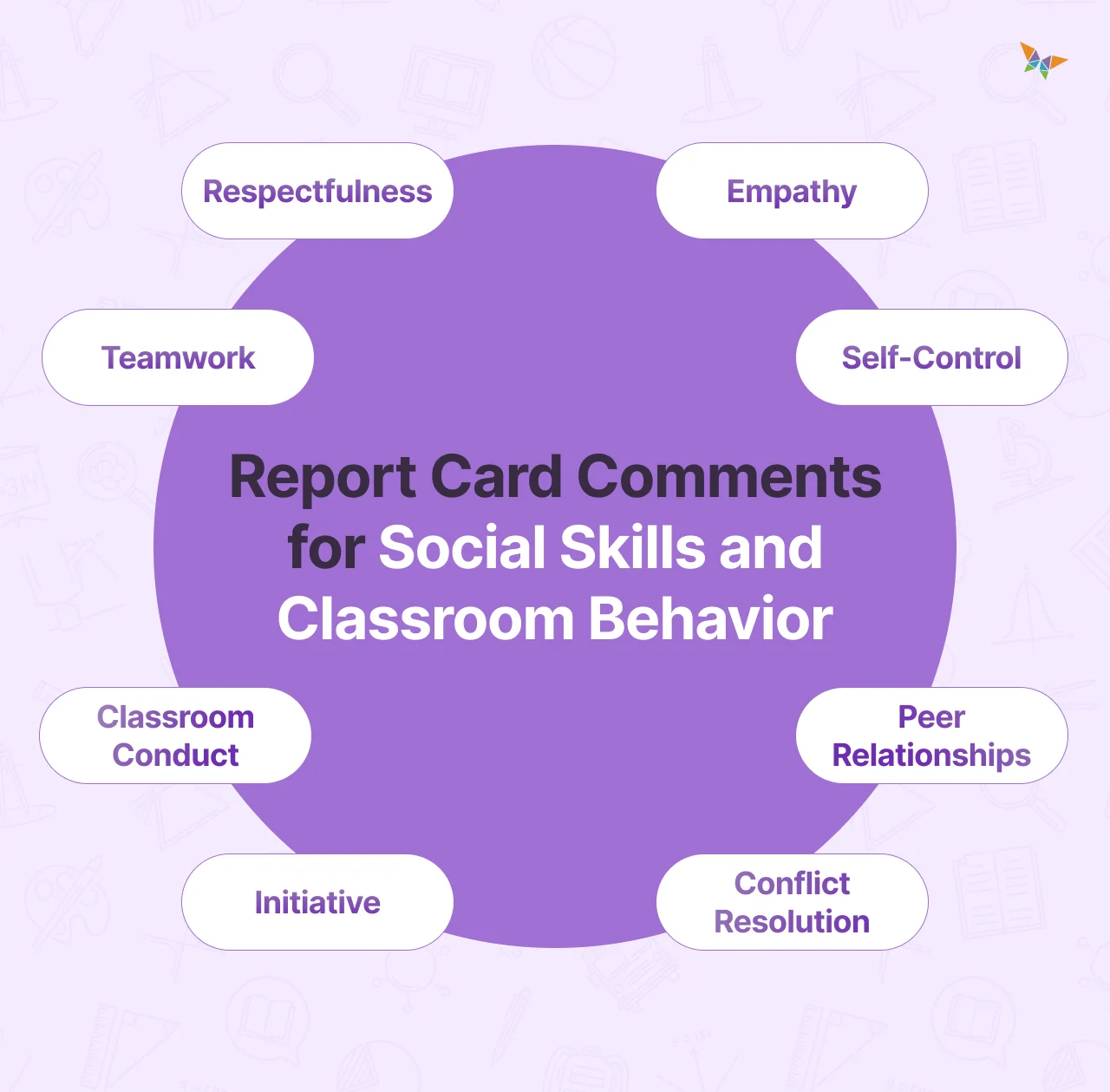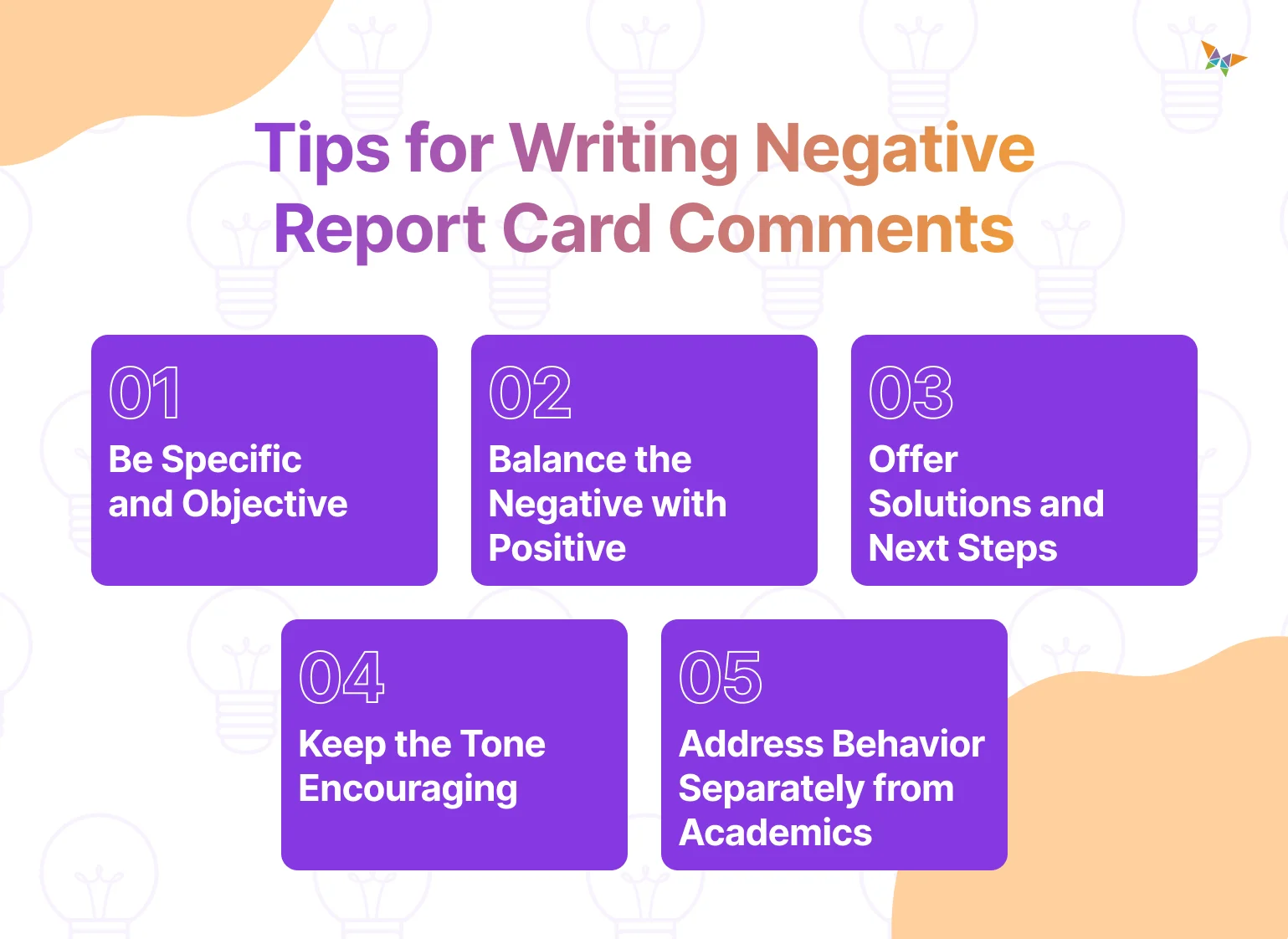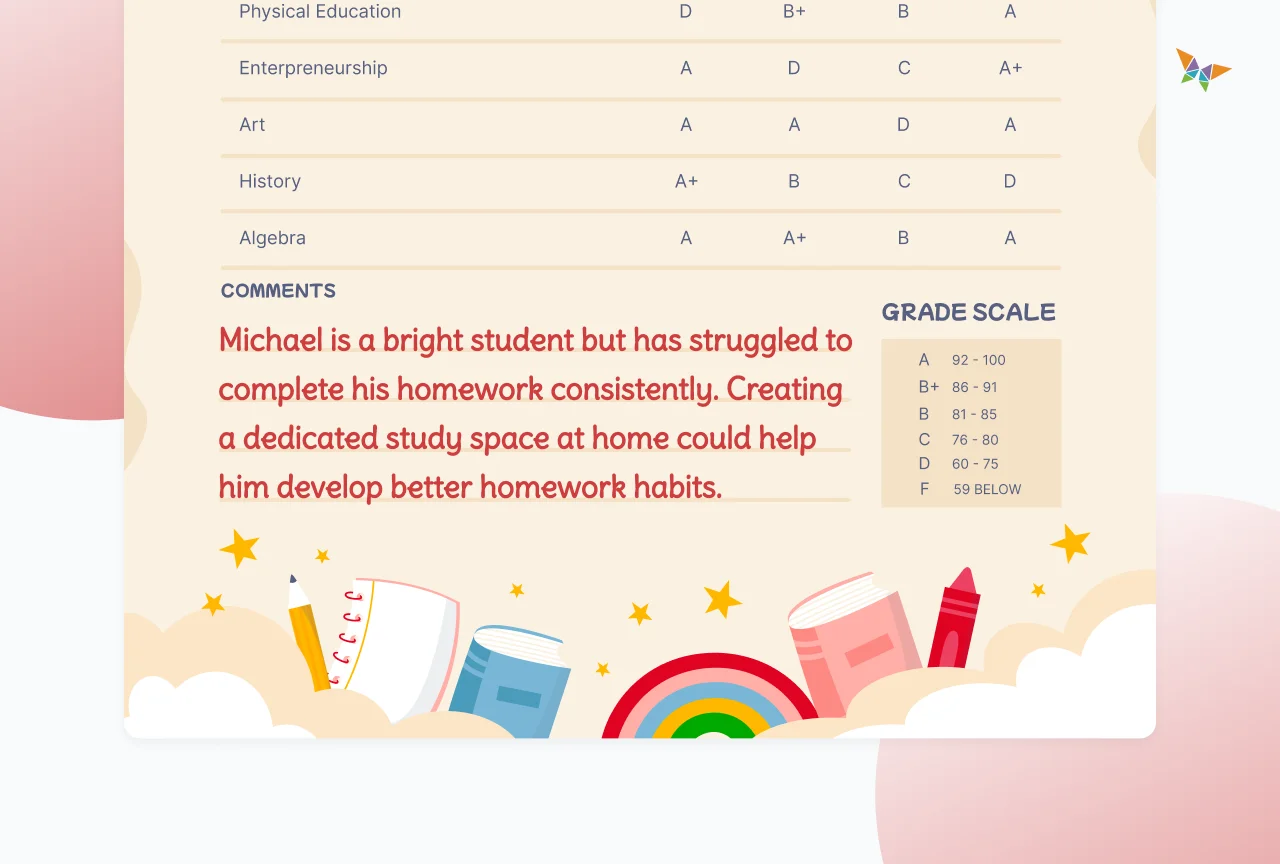Picture this: It's the end of the term, and you’re sitting at your desk, surrounded by a mountain of report cards. You’ve taught, inspired, and supported your students through weeks of learning. Now comes the daunting task of encapsulating their progress in a few lines.
As teachers, we know that writing meaningful report card comments can sometimes feel like searching for a needle in a haystack.
How do you capture a student's journey, their triumphs, and areas for growth, all while being concise, clear, and supportive?
We’ve all been there—staring at a blank space, wondering how to transform our observations into report card comments that are not only informative but also encouraging and motivating.
The struggle is real! But we’ve got you covered. We’re here to help you navigate this challenge with ease and confidence.
In this blog, we’ll dive into the art of writing report card comments that resonate with students and parents alike.
Whether you need 50 quick report card comments, tailored feedback for preschool, kindergarten, or primary school, or strategies for delivering constructive feedback, we’ve everything.
So, bookmark this blog, get comfortable, and let’s turn this task into an enjoyable and rewarding experience!
Report card comments provide insights into a student's academic performance, behavior, and overall development throughout the term. These are in a nutshell, teachers' remarks on the report card that act as a vital communication tool between teachers, parents, and students.
Unlike grades which offer a quantitative measure of achievement, report card comments offer qualitative feedback that paints a fuller picture of a student's progress.
Imagine you're a parent eagerly opening your child's report card. The grades are there, but it's the report card comments that tell the real story. They explain why a child excels in math but struggles with reading, or how their confidence has grown in social settings.
These comments bridge the gap between home and school—fostering a collaborative environment where everyone is working towards the common goal of the student's success.
Whether you're writing a few lines or a detailed paragraph, these comments have the power to inspire, guide, and support each student's unique learning journey.
Report card comments are a cornerstone of effective education and communication. They are the unsung heroes of student feedback, offering a deeper insight into each learner's journey.
Here’s why they’re so essential:
1. Personalized Insights into Student Progress
Grades alone can't capture the nuances of a student's performance.
Imagine telling Neha, "Your creativity in solving math problems is outstanding!" or informing Joseph, "Your curiosity in science class makes you a budding young scientist."
Personalized feedback like this recognizes each student's unique talents and areas for growth, providing a clearer picture than grades alone ever could.
They address individual strengths, weaknesses, and unique characteristics. It helps students and parents understand the full scope of the student's progress.
2. Motivation through Recognition
Think about the smile on a student's face when they read, "Great job on your recent history project, Sarah! Your research skills are impressive."
Comments like these can inspire students to keep pushing forward, knowing their efforts are noticed and appreciated.
Positive reinforcement acknowledges their hard work and achievements, encouraging them to keep striving for success.
3. Constructive Guidance for Growth
Constructive feedback highlights areas where students can improve and offers specific suggestions for how to do so
For instance, you might write, "Mischelle, you've made great strides in reading. To keep improving, try to read aloud at home for 10 minutes each day."
This guidance is crucial for helping students understand what they need to work on and how they can achieve their goals.
4. Trust and Rapport for Parent-Teacher Partnerships
Clear communication builds trust and collaboration. When parents read, "Lily is doing well in math but sometimes rushes through her work. Encouraging her to take her time at home could help."
They gain valuable insights and can better support their child's learning at home. In short, it helps facilitate a partnership that supports the student's overall educational journey.
5. Progress Tracking Over Time
Report card comments provide a written record of a student's development over time.
For instance, comments like, "Over the year, Alex has grown more confident in sharing his ideas in class discussions," help track long-term progress.
This documentation is also valuable for identifying trends and making informed decisions about future educational strategies.
6. Holistic View of Student Development
Academic performance is just one piece of the puzzle. Beyond academics, report card comments can address social skills, behavior, and emotional development.
For example, "Sophia is a great friend to her classmates and always helps others when they need it." This holistic view ensures that all aspects of the student's growth are considered and supported.
By crafting thoughtful and detailed report card comments, teachers not only support their student's academic growth but also contribute to a positive and encouraging learning environment.
It’s all about painting a complete picture of each student’s unique journey, celebrating successes, and providing the guidance they need to thrive.
Crafting effective report card comments requires a thoughtful approach that balances encouragement with constructive feedback. Here’s how you can make your comments impactful:
Tip #1: Be Specific and Detailed
Instead of vague statements, get specific about a student's achievements. For instance,
❌ "Samantha did well in math."
✅ "Samantha consistently applies creative problem-solving strategies in math, which has led to noticeable improvements in her understanding of fractions."
Tip #2: Use Positive Language
Highlight strengths first to set a positive tone. For instance,
❌ "John struggles with organization."
✅ "John has shown significant improvement in organizing his assignments, which has helped him complete tasks more efficiently."
Tip #3: Link to Learning Objectives
Connect your comments directly to what students are learning in class. This shows how the feedback relates to the curriculum and educational goals. For example,
❌ "Emily can analyze historical events.”
✅ "Emily's ability to analyze historical events demonstrates a deep understanding of our unit on World War II."
Tip #4: Provide Actionable Feedback
Include suggestions for improvement that are clear and achievable. Give suggestions that students can act on. For example,
❌ "Sarah needs to Improve her reading comprehension.”
✅ "To improve reading comprehension, Sarah could try reading aloud for 10 minutes each day. This practice can help strengthen her understanding of complex texts."
Tip #5: Balance Areas of Growth
Acknowledge areas where students excel while gently addressing areas needing development. This helps maintain a balanced perspective on their progress. For example,
❌ ”Nisha needs to work on her ideas to contribute to the discussions.”
✅ "Nisha is a confident speaker in class discussions but could work on elaborating more on her ideas to deepen her contributions."
Tip #6: Personalize Each Comment
Tailor your comments to reflect each student's unique qualities and learning journey.
This personalized approach demonstrates that you understand and appreciate their individual efforts and challenges. For example,
❌ “Ella’s is a creative child.”
✅ "Ella’s creativity shines through in her artwork, where she consistently experiments with new techniques and styles."
Tip #7: Consider the Student's Perspective
Write comments that respect the student's efforts and progress. Positive reinforcement and constructive advice should inspire students to strive for improvement. For instance,
❌ "Simran needs to improve her writing skills. Her essays lack organization and depth."
✅ "Simran has been working hard to improve her writing skills. With continued practice in organizing her ideas and expanding on key points, she will see further improvement."
Tip #8: Be Professional and Encouraging
Maintain a professional tone while also conveying encouragement and support. Your comments should inspire students to continue striving for improvement. For example,
❌ "Matthew struggles with math. He often gets stuck on difficult problems and takes too long to finish assignments."
✅ "Matthew is making progress in math. He demonstrates dedication to understanding complex concepts and applies a thorough problem-solving approach during class activities."
Tip #9: Invite Parent Involvement
Encourage parents to discuss the comments with their child and ask questions if needed. This fosters a collaborative effort in supporting the student's learning both at school and at home. For example,
❌ ”Khush is often distracted during science experiments. He needs to focus more and participate actively."
✅ "Feel free to ask Khush about his progress in science experiments; he’s shown a keen interest in exploring scientific concepts during our hands-on labs."
Tip #10: Proofread and Edit
Before finalizing, review your comments to ensure they are clear and supportive. Your comments should effectively communicate how students are progressing toward their learning goals.
By following these tips, you'll create report card comments that not only inform parents but also motivate students to continue growing and learning. It’s all about recognizing achievements and guiding them toward even greater success!
We’ve understood, that writing report card comments is a valuable opportunity to provide meaningful feedback to students and their families.
Effective comments should be specific, encouraging, and relevant to each student's academic progress and personal development.
Here are quick comments tailored for each grade level to help communicate achievements and areas for growth effectively.
1. Pre-School
A. Tips for Writing Quick Report Card Comments for Preschoolers
- Focus on Developmental Milestones: Highlight progress in social skills, motor skills, and early learning concepts.
- Use Simple Language: Ensure comments are easy for parents to understand and reflect preschool-specific achievements.
- Celebrate Individuality: Acknowledge each child’s unique strengths and areas for growth.
- Provide Examples: Use specific examples of activities and behaviors to illustrate progress.
- Encourage Further Development: Suggest activities parents can do at home to support learning and development.
B. 50 Quick Report Card Comments for Preschoolers
2. Kindergarten
A. Tips for Writing Quick Report Card Comments for Kindergarten Kids
- Highlight Foundational Skills: Comment on progress in literacy, numeracy, and social-emotional development.
- Acknowledge Curiosity: Mention the child’s curiosity and enthusiasm for learning.
- Note Growth Areas: Identify specific areas where the child has shown improvement throughout the year.
- Include Positive Language: Start with strengths before addressing areas for improvement.
- Prepare for Transition: Discuss readiness for first grade and any areas to focus on for continued growth.
B. 50 Quick Report Card Comments for Kindergarten Kids
3. Primary School
A. Tips for Writing Quick Report Card Comments for Primary School Students
- Be Subject-Specific: Provide comments tailored to each subject area (e.g., math, reading, science).
- Highlight Progress: Note improvements in skills such as reading comprehension, math fluency, and critical thinking.
- Encourage Effort: Recognize effort and perseverance in tackling challenging tasks.
- Address Social Skills: Comment on interactions with peers and participation in classroom activities.
- Set Goals: Discuss goals for the next term or year and how parents can support their child’s learning.
B. 50 Quick Report Card Comments for Primary School Students
4. Middle School
A. Tips for Writing Quick Report Card Comments for Middle School Students:
- Acknowledge Growth: Comment on academic progress and maturity in handling more complex subjects.
- Focus on Study Skills: Discuss organizational skills, time management, and study habits.
- Encourage Independence: Recognize independent thinking and decision-making skills.
- Discuss Extracurricular Involvement: Highlight participation in clubs, sports, or community service.
- Prepare for High School: Mention readiness for high school and areas to strengthen before transitioning.
B. 50 Quick Report Card Comments for Middle School Students
5. High School
A. Tips for Writing Quick Report Card Comments for High School Students
- Prepare for Future Goals: Comment on academic achievements and alignment with future aspirations.
- Provide College/Career Readiness Feedback: Discuss skills and experiences that prepare the student for post-secondary education or career paths.
- Discuss Academic Challenges: Address any challenges faced and strategies for improvement.
- Highlight Leadership and Responsibility: Recognize leadership roles, responsibilities, and contributions to the school community.
- Encourage Reflection: Suggest areas for self-reflection and growth in preparation for future endeavors.
B. 50 Quick Report Card Comments for High School Students
These comments provide specific feedback on each student's progress, efforts, social skills, and goals for future improvement, helping to guide both students and parents in supporting continued growth and learning.
When it comes to report card comments, tailoring them to specific situations can make a world of difference.
Imagine giving feedback that truly resonates with your student, offering clear insights and actionable advice.
By focusing on positive performance, identifying areas for improvement, and noting behavioral observations, you can paint a comprehensive picture of each student's journey.
In the section below, you'll find examples of encouraging comments, constructive feedback, and observations on social skills and classroom behavior.
These detailed and personalized comments are designed to provide a balanced view of your students’ progress, celebrate their achievements, and guide their future growth. Let’s dive in!
1. Positive Performance: Examples of Encouraging Report Card Comments
Highlighting positive performance is essential to encourage students and acknowledge their hard work and achievements.
Here are some detailed and personalized examples:
- Academic Excellence
“Ava consistently demonstrates exceptional understanding of math concepts, particularly in algebra and geometry. Her ability to solve complex problems with ease and accuracy is truly impressive."
- Creativity
"Ethan’s creativity shines in his writing, where he uses imaginative ideas to craft engaging stories. His recent narrative about space exploration was captivating and showed great attention to detail."
- Class Participation
"Olivia actively participates in class discussions, contributing thoughtful insights and encouraging her peers to engage. Her questions often lead to deeper exploration of the topics we cover."
- Improvement
"Jacob has made significant progress in reading comprehension, showing a deeper understanding of the material. His ability to summarize and analyze texts has notably improved since the beginning of the term."
- Leadership
"Sophia has shown outstanding leadership skills in group projects, guiding her team to successful outcomes. Her ability to delegate tasks and support her peers is commendable."
- Persistence
"Lucas demonstrates perseverance, tackling challenging tasks with determination and never giving up. His efforts in mastering multiplication have paid off, and he now completes problems with confidence."
- Collaboration
"Mia works well with her classmates, always ready to help and share ideas, fostering a collaborative environment. Her teamwork skills were particularly evident during our recent science project."
- Subject Expertise
"Ahmed’s enthusiasm for science is contagious, and he often leads by example in lab activities. His curiosity drives him to ask insightful questions and explore topics beyond the curriculum."
- Growth
"Emily has made great strides in her reading fluency, now reading aloud with confidence and expression. Her recent book report on 'Charlotte's Web' was thorough and insightful."
- Budding Talent
"Jayden’s artistic talent is evident in his detailed and creative artwork, which adds vibrancy to our classroom. His recent drawing of the school garden was particularly impressive."
2. Areas for Improvement: Examples of Constructive Feedback Report Card Comments
Constructive feedback is crucial for guiding students on how to improve and achieve their full potential.
Here are some detailed and personalized examples:
- Attention to Detail
"Ava would benefit from taking more time to review her work for accuracy before submitting assignments. Encouraging her to double-check her math calculations could prevent small errors."
- Improvement of Skills
"Ethan should focus on practicing his multiplication tables to improve his math fluency. Regular practice at home using flashcards or math games could be beneficial."
- Class Participation
"Olivia is encouraged to participate more in class discussions to share her valuable insights. Her contributions are always thoughtful, and hearing more from her would enrich our discussions."
- Practice Requirement
"Jacob could benefit from reading more diverse genres to expand his vocabulary and comprehension skills. Exploring different types of books, such as historical fiction or science fiction, could enhance his reading experience."
- Time Management
"Sophia should work on managing her time more effectively to ensure all assignments are completed on schedule. Using a planner to keep track of homework and deadlines might help her stay organized."
- Focus in Class
"Mia is encouraged to stay focused during lessons to better grasp the material being taught. Sitting closer to the front of the classroom might help minimize distractions."
- Organization:
"Ahmed would benefit from organizing his notes and assignments to keep track of his progress more efficiently. A dedicated binder for each subject could help him stay organized."
- Effort Requirement
"Emily is encouraged to put more effort into her science experiments and ask questions when she needs clarification. Partnering with a classmate who excels in science could provide additional support."
- Homework Completion
"Jayden should ensure he completes all his homework assignments on time to reinforce his learning. Setting a regular homework routine at home could improve his consistency."
- Active Listening
"Liam would benefit from improving his active listening skills during lessons. Encouraging him to make eye contact with the speaker and avoid distractions can help him retain information better."
3. Behavioral Observations: Examples of Social Skills and Classroom Behavior Report Card Comments
Behavioral observations provide insights into a student’s social interactions and conduct in the classroom.
Here are some detailed and personalized examples:
- Respectfulness
"Ava consistently shows respect towards her teachers and classmates, contributing to a positive classroom environment. Her polite demeanor and willingness to listen to others set a great example."
- Teamwork
"Ethan works well in group settings, always willing to listen to others and collaborate effectively. His ability to mediate and ensure everyone’s voice is heard is particularly noteworthy."
- Empathy
"Olivia demonstrates empathy towards her peers, often helping those who are struggling. Her kind actions, such as assisting a classmate with their reading, create a supportive atmosphere."
- Self-Control
"Jacob has shown improvement in self-control, staying focused and calm during class activities. His ability to manage distractions has positively impacted his learning experience."
- Classroom Conduct
"Sophia maintains excellent classroom behavior, following rules and setting a good example for her peers. Her respectful attitude and readiness to participate make her a model student."
- Initiative
"Lucas takes initiative in class, often volunteering for tasks and leading by example. His proactive approach to learning inspires his classmates to be more engaged."
- Peer Relationships
"Mia has built strong relationships with her classmates, showing kindness and cooperation. Her friendly nature and willingness to include others in activities are admirable."
- Conflict Resolution
"Ahmed handles conflicts maturely, often mediating disputes and finding peaceful solutions. His ability to understand different perspectives helps resolve issues amicably."
- Positive Attitude
"Emily brings a positive attitude to class every day, which is infectious and motivates her peers. Her enthusiasm for learning creates a lively and dynamic classroom environment."
- Listening Skills
"Jayden is a good listener, always attentive during lessons and respectful when others are speaking. His ability to absorb information and respond thoughtfully is a valuable asset."
By addressing these different aspects of student performance and behavior, you can provide comprehensive feedback that supports student growth and development in both academic and social areas.
Interested in implementing modern teaching methods that inspire and motivate students to achieve their best? Connect with a Suraasa mentor and see the difference in your teaching effectiveness.
4. Students with High Potential but Low Motivation: Examples of Inspirational Report Card Comments
Students with high potential but low motivation often require thoughtful encouragement to fully apply themselves. By recognizing their natural abilities and providing targeted motivation, teachers can help these students unlock their full capabilities.
Here are some detailed and personalized examples:
- Recognizing Potential
"Ava demonstrates a strong understanding of complex concepts, but she sometimes lacks the drive to consistently apply herself. Encouraging her to set small, achievable goals could help her maintain focus and maximize her potential."
- Encouraging Effort
"Jacob’s aptitude for writing is evident, though his enthusiasm varies. By finding topics that ignite his interest and setting personal challenges, he could fully harness his talent and produce outstanding work."
- Setting Goals
"Olivia has shown flashes of brilliance in her science projects, yet she occasionally struggles with motivation. Setting specific academic goals and tracking her progress could help her maintain her momentum and achieve great things."
- Positive Reinforcement
"Ethan has exceptional problem-solving skills but sometimes needs encouragement to fully engage. Recognizing and celebrating each small success could help boost his motivation and lead to consistent effort."
- Inspiring Growth
"Sophia’s creativity is remarkable, though she occasionally needs a push to fully explore her ideas. Encouraging her to take pride in her progress and challenge herself further could unlock even greater achievements."
- Encouraging Initiative
"Lucas has a natural grasp of the material, but he sometimes waits for direction rather than taking the initiative. Challenging him to explore topics that interest him could help reignite his enthusiasm for learning."
- Promoting Self-Motivation
"Mia’s talent shines during group activities, but she struggles with self-motivation when working independently. Setting personal rewards for completing tasks might help her develop a more consistent work ethic."
- Highlighting Potential Impact
"Ahmed has the ability to excel across subjects, but his inconsistent motivation holds him back. Encouraging him to consider the long-term benefits of his hard work might inspire him to apply himself more fully."
- Encouraging Reflection
"Emily’s work often reflects deep insight, but she doesn’t always apply herself fully. Reflecting on how much more she could achieve with consistent effort might help her realize the full extent of her abilities."
- Offering Support
"Jayden shows flashes of brilliance in his work, but maintaining that level of engagement has been a challenge. I’m here to support him in finding new ways to stay motivated, whether through setting goals or exploring new, exciting topics."
By addressing these different aspects of student motivation and potential, you can provide comprehensive feedback that encourages students to strive for excellence and fully develop their talents.
Writing negative report card comments can be challenging, but it’s important to provide constructive feedback that helps students improve.
The goal is to be honest yet supportive, guiding students towards better performance while maintaining a positive tone.
Here are some tips to help you craft thoughtful and effective negative comments:
Tip #1: Be Specific and Objective
Avoid generalizations and focus on specific behaviors or areas where improvement is needed. This makes the feedback clear and actionable.
Example:
Tip #2: Balance the Negative with Positive
Start with a positive observation before addressing the negative issue. This helps soften the feedback and keeps the student motivated.
Example:
Tip #3: Offer Solutions and Next Steps
Provide specific suggestions for improvement. This gives students a clear path to follow and shows them that improvement is possible.
Example:
Tip #4: Keep the Tone Encouraging
While it's important to address issues, maintaining an encouraging tone can make the feedback more palatable and constructive.
Example:
Tip #5: Address Behavior Separately from Academics
If the issue is behavioral, address it separately from academic performance. This clarifies that the behavior, not the student as a whole, is the concern.
Example:
Here are some detailed and comprehensive examples of negative report card comments, using the tips above:
- Attention to Task
"Sarah has great potential but often has difficulty staying on task. Setting clear goals and providing short breaks might help her maintain focus during assignments."
- Homework Completion
"Michael is a bright student but has struggled to complete his homework consistently. Creating a dedicated study space at home could help him develop better homework habits."
- Class Participation
"Lily has insightful ideas but is often hesitant to participate in class discussions. Encouraging her to share her thoughts more often could boost her confidence."
- Time Management
"James needs to work on his time management skills. He frequently submits assignments late. Using a planner to keep track of deadlines might help him stay organized."
- Behavior in Class
"Noah often talks to his friends during lessons, which disrupts the class. Reminding him of classroom rules and the importance of respecting others' learning time could improve this behavior."
- Effort in Subjects
"Ella shows a lot of enthusiasm for her favorite subjects but tends to put less effort into areas she finds challenging. Encouraging her to tackle difficult tasks with the same energy could help her improve overall."
- Listening Skills
"Mason sometimes struggles to follow instructions the first time they are given. Encouraging him to ask questions if he's unsure and repeating instructions might be helpful."
- Group Work
"Sophia excels in individual tasks but finds group work challenging. Working on her collaboration skills through structured group activities could be beneficial."
- Test Preparation
"Ethan's test scores suggest he may not be preparing effectively. Helping him develop a study schedule and practice test-taking strategies might improve his performance."
- Respect for Others
"Avery occasionally has difficulty respecting her classmates' opinions during discussions. Encouraging her to listen actively and consider different perspectives can enhance her social skills."
By addressing negative feedback with specificity, balance, and encouragement, you can help students understand their areas for growth while motivating them to improve.
And there you have it—your guide to writing effective report card comments.
From understanding the purpose and significance of report card comments to practical tips and examples tailored for every grade level and situation, you’re now equipped to deliver feedback that inspires growth and fosters collaboration.
Remember, each comment you write is a chance to celebrate achievements, guide improvements, and strengthen partnerships. Whether highlighting progress or addressing challenges, your words hold the power to make a meaningful impact on each student’s educational journey.
As you continue to craft personalized feedback with care and insight, you're not just documenting progress but actively shaping futures.
Here’s to creating a supportive and encouraging learning environment where every student can thrive.
Happy writing, and all the best for your future report card comments!







